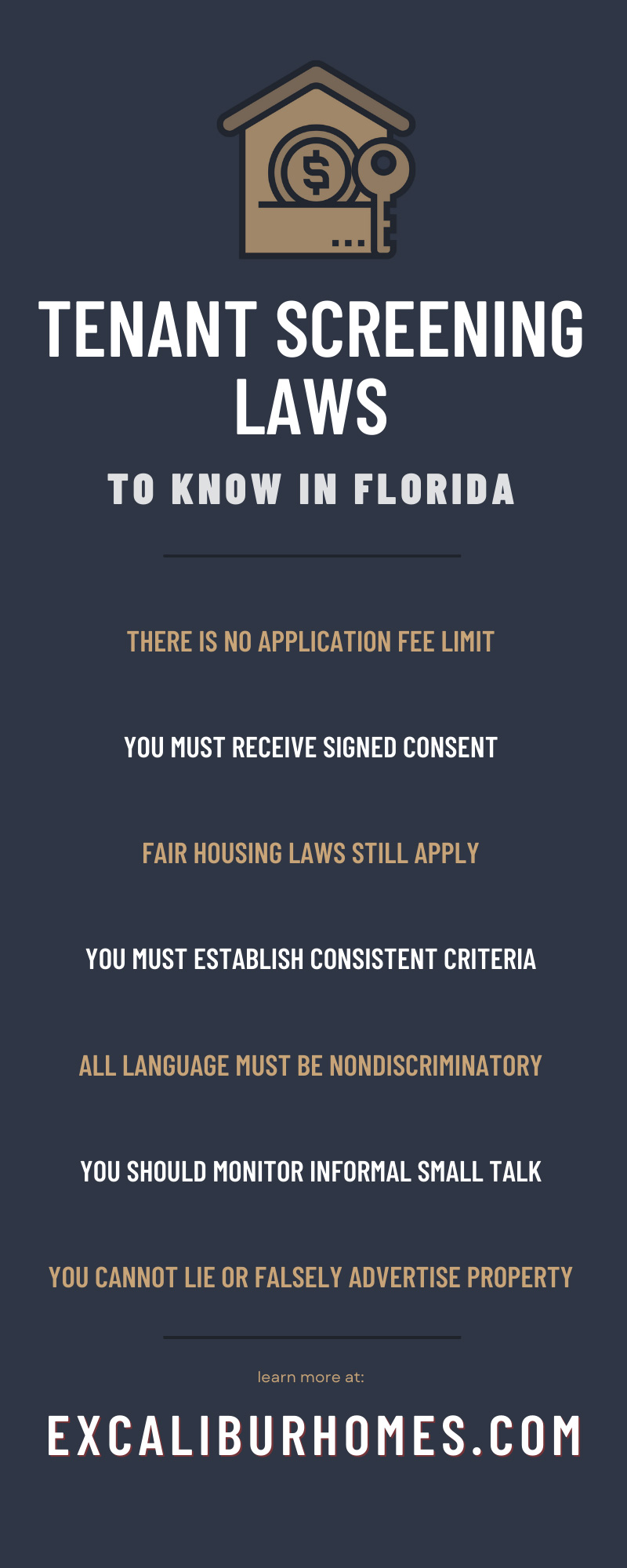
A background check can tell you everything you need to know about an applicant and help you pick the best tenant for your rental property. However, learning how to properly conduct a background check is even more important. Not only does it ensure you know all the relevant information, but it protects you from violating Fair Housing Laws. These laws are complex, and many landlords violate them without even knowing it, mostly by making simple screening mistakes. If you want to protect yourself and your investment, let’s review the most important Florida tenant screening laws.
There Is No Application Fee Limit
Charging an application fee signals to potential applicants you intend to run a background check, which can help weed out less-than-ideal tenants. In the state of Florida, there is no legal limit regarding how much you can charge for an application fee. However, you should keep the pricing in a similar range to the cost of your background check—typically around 20 to 50 dollars, depending on the service. Charging a ridiculously high application fee isn’t illegal, but it can seriously restrict your application, barring you from finding a good tenant in the first place.
You Must Receive Signed Consent
To conduct a credit background check or a criminal history check, you must first receive the applicant’s signed consent. This means your written application should clearly state you intend to run a background check, with a place for the applicant to put their name and signature. Without the clear consent of a signature, you’re actively violating Florida Housing Laws and the Federal Trade Commission’s Fair Credit Reporting Act (FCRA). Fortunately, much like the application fee, this helps remove troublesome applicants from the tenant pool without you having to do any additional work.
Fair Housing Laws Still Apply
In 1988, the Fair Housing Act (FHA) broadened to prevent discrimination against protected classes seeking to rent or buy a home. For landlords, this means you cannot discriminate against or reject a tenant based on their race, color, religion, sex, origin, familial status, or physical or mental disability. Also, you cannot reject an applicant for requesting or needing reasonable accommodations, such as housing a service animal despite a no-pet policy. This anti-discrimination law also applies to how you speak to, advertise, and interview a tenant, which we will discuss later.
Blanket Policies Regarding Criminal History Are Illegal
Whether a person has received a criminal conviction or not, you cannot have a blanket policy that immediately rejects all applicants with some form of a criminal record or history. However, there are some convictions you can deny an applicant for, but some of them have time limits, and they’re usually convictions that put the property or community at risk. You can deny an applicant with a felony conviction, but only if it was within the past seven years. Additionally, you can deny an applicant for domestic violence, assault and battery, sexual assault, and serious drug charges.
There Are No Criminal Record Usage Restrictions
Aside from requiring a signed disclosure consenting to a background check, Florida does not have any additional FCRA laws, nor does it restrict the usage of criminal records. All criminal records are public and accessible to Florida landlords unless the record has received a court order for official sealing. Most Florida tenant screening services provide statewide and countywide access to criminal records, so landlords can view applicants’ full criminal histories.
You Must Establish Consistent Criteria
Despite all these regulations, you are allowed to restrict and reject applicants if they don’t meet your criteria. These criteria can include having a good credit score, having verifiable income, consenting to a background check, etc. However, whatever criteria you set must be consistent and apply to all applicants. If you put different standards on different applicants, you could receive a Fair Housing Complaint, even if your intention wasn’t to discriminate. The more rigid, consistent, and business-like your criteria and decisions are, the less likely you are to receive an FHA complaint.
All Language Must Be Nondiscriminatory
The wording and verbiage you use to advertise, speak with, or interview tenants must be unbiased and nondiscriminatory. You cannot ask questions regarding their gender, sexual orientation, religion, etc. Remember, the application and the background check will tell you all you need to know, but certain questions during the interview can put you in hot water. For example, the application should tell you how many people will be occupying the property, but you can’t directly ask them how many children they have. It’s best to stay neutral and general, even in your marketing materials.
You Should Monitor Informal Small Talk
You should always be aware of how you’re speaking to an applicant outside of the screening process as well. What may be an innocent question to get to know someone can absolutely be used against you. Even a question such as “Where are you from?” could come across as an attempt to know and discriminate against their country of origin. While they may not accuse you of this at first, they can claim discrimination if you upset or evict them later on.
You Cannot Lie or Falsely Advertise Property
Under no circumstances are you allowed to lie about the availability of a property simply because you don’t want to rent to someone—even if it’s for nondiscriminatory reasons. For example, say you’re in a college town, and you specifically want to rent to college students. If someone applies that isn’t a student, you can’t reject them simply because of their education status. You also cannot lie about the pricing of a property or change the price depending on the person you’re speaking with. Even if they’re not part of a protected class, this could still land you in some seriously hot water.
Now that you’re up to date on Florida’s tenant screening laws, you’re one step closer to finding the perfect tenant for your rental property. If you need help conducting background checks or are having trouble finding applicants, let Excalibur Homes help. We’re a professional property management company in Jacksonville, Florida, with well-established and accredited property managers dedicated to helping landlords like you! Contact us today!



